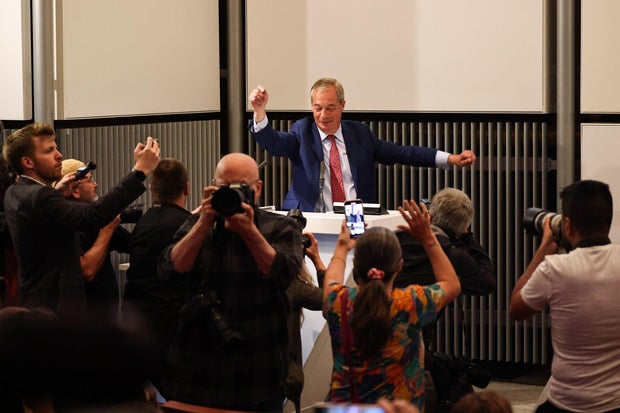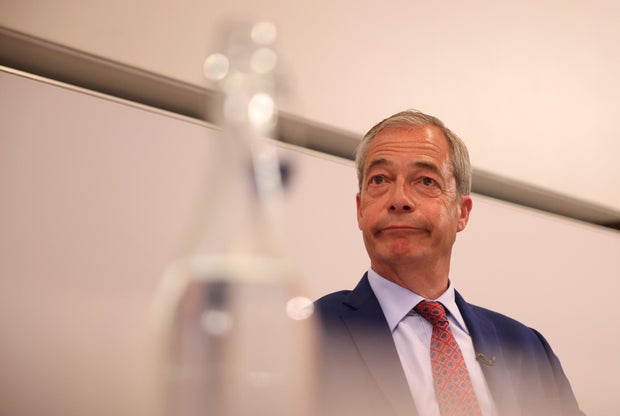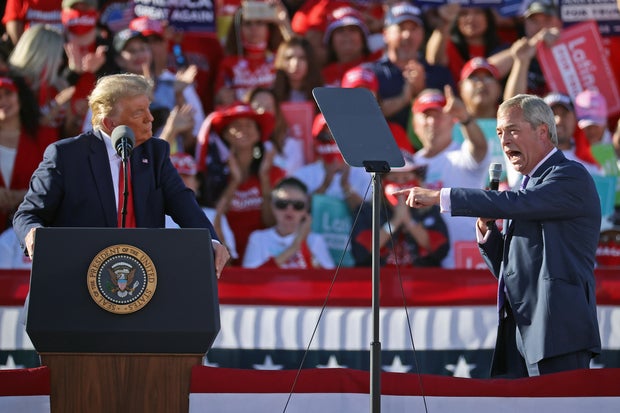The Labour Party and its leader, new British Prime Minister Keir Starmer, undoubtedly won the U.K. general election, but as he set to work building his new cabinet, there was another politician keen to crow about his party’s election windfall, much smaller though it was. Nigel Farage, the leader of the far-right Reform UK party and long one of Britain’s most divisive politicians, was heckled by a series of protesters as he took the stage to deliver a speech in London on Friday.
He smiled through the interruptions, and even heckled his hecklers back, loudly chanting “boring!” as they were removed from the hall.
Reform UK grabbed only four seats in the British Parliament’s 650-seat House of Commons in Thursday’s national election. But that’s four more than it had before.
Farage argues that the U.K.’s first-past-the-post voting system makes it difficult for smaller parties to match their overall share of the votes with their share of seats won in the Commons, and he vowed on Friday to push for an end to the current system. But the real success for Farage was in the overall vote tally, not the four seats his party won, which included his own first election to the parliament.
To the consternation of the long-ruling Conservative Party, from which it pilfered a huge amount of support, the anti-immigration Reform UK, whose leader and policies had long been relegated to the fringes of British politics, took about 15% of the vote, with just over 4 million ballots in total.
That gave Reform UK the third-highest overall vote count among all the parties that competed for the parliamentary seats, overtaking even the Liberal Democrats, who, despite getting about half a million fewer votes, emerged on Friday with a record 71 seats in the Commons.
Farage, 60, won the seat in his home constituency of Clacton, in southeast England, after seven previous failed attempts. His Reform UK party, founded initially in 2018 as the Brexit Party, advocating for a complete and uncompromising break with the European Union, has always campaigned on cutting immigration to Britain.
The Englishman is often compared to his transatlantic ally former U.S. President Donald Trump, for both his brash political style and his nationalist rhetoric, and he’s appeared at events with the Republican in the U.S. and met with him in Britain, too.
“Congratulations to Nigel Farage on his big WIN of a Parliament Seat Amid Reform UK Election Success. Nigel is a man who truly loves his Country!” Trump wrote on his own social media platform, Truth Social, on Friday. Mr. Trump made no mention of the Labour Party’s landslide election victory, or Starmer becoming the new prime minister.
Farage’s campaign was marred by a number of 11th-hour controversies, mostly involving racist or sexist comments attributed to Reform UK candidates, and on election day he vowed to “professionalize” his party.
“Those few bad apples that have crept in will be long gone and we will never have any of their type back in our organization,” Farage told his supporters, along with the British public and his keenly observing political opponents.
Speaking to CBS News’ Emmet Lyons on Friday morning as the election results were finalized, the Labour Party Mayor of London Sadiq Khan acknowledged the rise of “popular nativist, nationalist movements,” and said Starmer would govern “in the national interest, show humility, be magnanimous and be humble over the course of the next three, four, five years.”
“We’ve got to earn the trust of those that voted Labour, but also try and win the confidence of those that didn’t,” he said.
That will undoubtedly be one of the chief missions of both the Labour and Conservative Parties in the years ahead.
They’ll both be eager to craft political strategies ahead of the next national election that can stop voters following the trend to the far-right seen across Europe in recent years – a trend which, despite their minimal presence in Parliament, was also demonstrated by Reform UK’s share of the votes this week.



